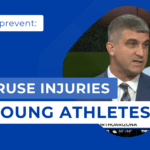Training For The Marathon? Do You Have A Running Injury?
Regardless of your running experience, you still need to remain aware of the various running injuries that can occur when exercising. Even the simplest injury will get worse quickly and hinder your practice without the proper treatment.
To keep yourself safe when training for the marathon, you should be aware of the common running injuries that may impact you and how to treat them.
Common Running Injuries
You need to remain aware of the running injuries that could impact you when training for a marathon so you can get the right treatment, on time.
The most common kinds of running injuries are:
- Runners’ Knee
Patellofemoral pain syndrome (PFPS), more commonly known as runners’ knee, is a temporary irritation that affects the soft cartilage on the underside of the knee.
This is the most common kind of running injury and is one that can seriously impact your training. Runners’ knee causes pain in and around the kneecap which will get worse with activity but can also appear to ‘come and go’ for many people.
It is possible to continue exercising while suffering from runners’ knee, but you should reduce the intensity and mileage until the symptoms subside. In most cases, this injury can be treated with physical therapy and anti-inflammatories.
- Shin Splints
Shin splints, known medically as medial tibia stress syndrome, causes persistant, aching pain around the shin bone which is caused by swelling in this area.
While all runners could suffer from shin splints, this is a common injury for new runners who are increasing their intensity, speed, or mileage for the first time.
To prevent this, you must wear the correct footwear for running and go at the right pace for your body when training.
- Stress Fracture
A stress fracture can occur in any bone when cumulative stress becomes too much for it to bear. For runners, the most common areas of the body to suffer from this injury are the shins, heels, and feet.
When you are suffeering from a stress fracture, you will experience intense pain in the afflicted area and will be unable to hold any weight onto this bone.
Stress fractures are usually caused by overtraining, meaning all kinds of runners can fall victim to this kind of injury. They can be very serious and cause permanent damage if they are not treated properly.
If you are dealing with a stress fracture, then you need to stop training immediately. Stop running or any other strenuous exercise until the fracture has healed, which can be between 6 to 8 weeks.
A period of immobilization is usually required with this kind of injury.
Following this recovery period, you should progress carefully from walking to jogging before attempting any other form of exercise.
- Pulled Muscle
A pulled muscle is a common injury in all forms of exercise, espeically running. It can be caused by fatigue, overuse, or an improper warm-up before running.
This kind of injury, which can also be called a muscle sprain, will come on suddenly and cause pain, soreness, and a limited range of motion in the affected area. Along with a pulled muscle, there may also be bruising, discoloration, or stiffness.
In serve cases, spasms in the affected area can also occur.
- Ankle Sprain
This kind of injury occurs when ligaments that support the movement of the ankle joint stretch beyond capacity and tear.
While an ankle sprain may be mild, it is important to stop running straight away.
Swelling and stiffness will accompany the pain in the ankle, which will get worse when walking or putting any pressure on the affected area.
Signs That You Are Developing A Running Injury
With these injuries in mind, there are some signs to look out for that will indicate whether you are suffering from one during training. These include:
- Unexplained burning or aching that appears during a running session. Even if this is mild, it should be treated immediately
- Long-term stiffness or soreness that occurs after running and seems to get worse over time
- Sudden onset of sharp lower body pain. This is always a sign that you should stop running and seek medical advice
Usually, most running injuries can be spotted through localized inflammation, swelling, and discoloration to some degree. However, it is best to err on the side of caution and seek medical advice on any new symptoms before you continue exercising, especially as a new runner.
How To Prevent Running Injuries
It is possible to prevent a majority of running injuries through proper care and attention, such as:
- Pace Yourself
Most injuries can be prevented by following a gradual training schedule that allows you to progress in intensity and mileage at a pace that is right for your body. These allow your body time to adjust, which will prevent strains and fatigue injuries.
Generally, these step-by-step improvements involve no more than around 5% of the time dedicated to sprints, with the majority running at a comfortable pace and intensity.
- Recovery Time
The length of recovery time that your body needs during training will vary based on your training speed, mileage, terrain, and intensity.
Regardless, you need to give your body time to rest and recover after running so it can resist damage later on.
- Listen To Your Body
When running, especially as a beginner, it is important to listen to your body and be aware of the signs of fatigue or overtraining. Your body will give you signs regarding your progress, comfort, and recovery time requirements, and not listening could cause serious damage.
The more you practice, the easier it will be to recognize these signs from your body however, it is best to be cautious when trying a new training program or intensity so you do not miss them.
Speak with an Orthopedic Specialist Today
Are you suffering from a recent injury? Make an appointment with one of our orthopedic specialists today to start your healing journey. OrthoArizona has nearly two dozen offices throughout the Valley, each focused on quality care, compassion, and excellent customer service. Since 1994, OrthoArizona has been dedicated to compassionate care of the highest quality.
The advice and information contained in this article are for educational purposes only and are not intended to replace or counter a physician’s advice or judgment. Please always consult your physician before taking any advice learned here or other educational medical material.











